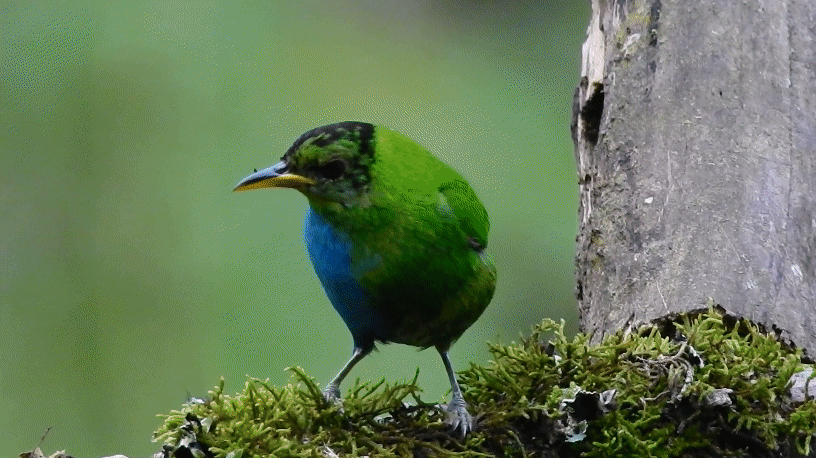New Research
Here's Why Most Dogs Have Brown Eyes
Humans may have bred their canine companions to have darker eyes, because we perceive them as younger and more friendly, study finds
Archaeologists Criticize Alleged Discovery of the 'Oldest Pyramid in the World'
A controversial study arguing an Indonesian structure is 25,000 years old is under investigation by the journal that published it
Lead Base Layer Discovered in Rembrandt’s 'The Night Watch'
Researchers analyzed a tiny paint sample from the piece and found a lead-rich layer on the canvas
Humans May Have Driven Twice as Many Bird Species to Extinction as Previously Thought
Statistical modeling of undiscovered extinctions suggests 1,430 bird species have disappeared during modern human history
Chimpanzees and Bonobos May Remember Faces for More Than 20 Years
The great apes, which are humans' closest living relatives, appeared to recognize photos of their former acquaintances in a study, even decades later
Melatonin Use Is Rising in U.S. Children, Study Finds
Nearly one in five children under 14 are being given melatonin before bed, according to a survey of about 1,000 parents
Like Dogs, Some Cats Will Play Fetch—but Mostly on Their Own Terms
Many felines appear to pick up the playful behavior spontaneously, without any explicit training, a survey of cat owners finds
Tiny 'Robots' Made From Human Cells Show Wound-Healing Potential
The so-called "anthrobots" can self-assemble and move on their own, and they prompted damaged neurons to regenerate in a recent study
Life-Sparking Gas Strengthens Evidence That Enceladus, a Moon of Saturn, Could Be Habitable
Evidence of hydrogen cyanide in data from the Cassini spacecraft adds to a growing list of molecules that could, in theory, support life on the icy moon
Why Most Pregnant People Experience Morning Sickness—and How It Could Be Treated
A hormone produced by the fetus may induce nausea and vomiting during pregnancy, a new study finds
This 'Extremely Rare' Bird Is Half Female, Half Male
The green honeycreeper is only the second of its species ever observed with this condition—and the first recorded in more than 100 years
Neanderthal DNA May Help Explain Why Some People Are Early Risers
A new study finds a link between Neanderthal DNA and modern human genes related to the internal body clock, or circadian rhythm
Watch Cockatoos Dip Their Food in Water to Make It Soggy
A new study marks the first time that dunking behavior has been documented in parrots
Cats Prey on More Than 2,000 Different Species
A new study sheds light on just how many creatures domestic cats will eat—including hundreds that are threatened or endangered
Parts of China's Great Wall Are Protected by a 'Living Cover' of Biocrusts
The layer of lichen, moss and cyanobacteria helps shield the historic structure from erosion, a new study finds
Eels Can Genetically Modify Nearby Fish With Their Electrical Pulses
In laboratory experiments, gene transfer occurred in 5 percent of zebrafish larvae that were near eels when they discharged electricity
Could a 550-Mile Pipeline From the Ocean Save the Great Salt Lake? Scientists Say Probably Not
New research suggests the electricity costs would exceed $300 million per year and carbon dioxide emissions could approach one million metric tons annually
Ancient Egyptians Kept Baboons in Captivity and Mummified Their Remains
A new analysis of the animals' skeletal remains reveals a lack of sunlight and an inadequate diet
Once Thought to Be Plants, These Rare Fossils Are Actually Baby Turtles, Scientists Say
The prehistoric specimens found in Colombia could represent one of the oldest and largest turtle species to ever exist
This Simple Trick Will Help You Brew Better Coffee, According to Scientists
New research explores how moisture affects static electricity and clumping of ground coffee beans
Page 3 of 236
:focal(1111x677:1112x678)/https://tf-cmsv2-smithsonianmag-media.s3.amazonaws.com/filer_public/4d/0c/4d0ca5df-da8c-452a-9bea-96613ed278b4/gettyimages-1125470365.jpg)
:focal(2592x1728:2593x1729)/https://tf-cmsv2-smithsonianmag-media.s3.amazonaws.com/filer_public/f8/10/f8104b21-0a51-47ca-acc9-a8940f26250f/gettyimages-458781974.jpg)
:focal(1024x839:1025x840)/https://tf-cmsv2-smithsonianmag-media.s3.amazonaws.com/filer_public/a5/52/a552fd91-ac1f-4418-ba59-e9bd4865fba8/the_nightwatch_by_rembrandt_-_rijksmuseum.jpg)
:focal(616x463:617x464)/https://tf-cmsv2-smithsonianmag-media.s3.amazonaws.com/filer_public/99/40/994052a2-a377-465d-b9e7-b4eb43bb6d57/ai-image-possible-extinctbirds3.jpg)
:focal(2880x1920:2881x1921)/https://tf-cmsv2-smithsonianmag-media.s3.amazonaws.com/filer_public/a6/29/a629229c-9782-4d21-b5d4-96310142e0d6/027a2815.jpeg)
:focal(400x267:401x268)/https://tf-cmsv2-smithsonianmag-media.s3.amazonaws.com/filer_public/0a/e5/0ae56afa-2af1-4652-abd3-1798872de815/gettyimages-1391112880_1.jpeg)
:focal(960x640:961x641)/https://tf-cmsv2-smithsonianmag-media.s3.amazonaws.com/filer_public/9a/b5/9ab5d286-eef1-464f-a871-6dd72a48bc2a/cat-649164_1920.jpg)
:focal(555x523:556x524)/https://tf-cmsv2-smithsonianmag-media.s3.amazonaws.com/filer_public/e0/c5/e0c570cd-473f-4748-83e9-20c35437129b/anthrobot_with_cilia_02.jpg)
:focal(500x500:501x501)/https://tf-cmsv2-smithsonianmag-media.s3.amazonaws.com/filer_public/15/05/1505e8ca-4d87-4589-ac26-a17af3e98dbf/enceladus.jpeg)
:focal(1061x707:1062x708)/https://tf-cmsv2-smithsonianmag-media.s3.amazonaws.com/filer_public/1b/72/1b72e2e9-a8ca-4e4f-8d68-c66659ff2a6c/gettyimages-1392122841.jpg)

:focal(3000x2000:3001x2001)/https://tf-cmsv2-smithsonianmag-media.s3.amazonaws.com/filer_public/5b/13/5b134ecf-b45c-4776-adda-34a0c4cdf3b7/pexels-acharaporn-kamornboonyarush-1028741.jpg)

:focal(960x640:961x641)/https://tf-cmsv2-smithsonianmag-media.s3.amazonaws.com/filer_public/f6/f3/f6f3493a-467f-4474-8c52-af5d021414b6/cat-5778777_1920.jpg)
:focal(2048x1541:2049x1542)/https://tf-cmsv2-smithsonianmag-media.s3.amazonaws.com/filer_public/10/85/10859f4f-3e95-462f-a0a0-392f2612eed9/close-up_view_of_biocrusts_on_the_great_wall_4.jpg)
:focal(1060x706:1061x707)/https://tf-cmsv2-smithsonianmag-media.s3.amazonaws.com/filer_public/2d/32/2d32e43f-aa3c-4339-8d67-e762196845be/gettyimages-174522285.jpg)
:focal(400x267:401x268)/https://tf-cmsv2-smithsonianmag-media.s3.amazonaws.com/filer_public/ba/64/ba64dfa3-33f5-40dc-85d0-f2223f0b2942/gettyimages-1332144553_1.jpeg)
:focal(1440x1083:1441x1084)/https://tf-cmsv2-smithsonianmag-media.s3.amazonaws.com/filer_public/e6/f7/e6f74418-2780-4c4a-b8c8-94a4f144f2a7/baboons.jpeg)
:focal(502x325:503x326)/https://tf-cmsv2-smithsonianmag-media.s3.amazonaws.com/filer_public/84/a3/84a34abe-ef48-4370-82bc-d6752b1342ce/ezgif-1-73be12d57b.png)
:focal(960x640:961x641)/https://tf-cmsv2-smithsonianmag-media.s3.amazonaws.com/filer_public/1f/c7/1fc74f90-a9a9-4b3a-8e11-029c8af7b1f2/coffee-4334647_1920.jpg)